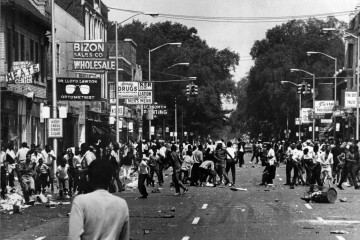In the summer of 1967, as racial tensions fueled by economic inequality boiled over in violent riots across the nation, President Lyndon B. Johnson tasked a small, bipartisan commission with answering three key questions: What happened? Why did it happen? And what could be done to prevent it from happening again?
Wednesday, at a gathering of experts brought together to discuss the landmark document that attempted to answer those questions, Johns Hopkins University President Ronald J. Daniels asked another question: Why have we not made more progress?
"Why do we find ourselves, 50 years on, repeating history in places from Staten Island to Ferguson?" Daniels said at a conference marking the 50th anniversary of the Kerner Report. "How can we recommit to understanding the issues highlighted by the Kerner Commission and find the right instruments to effect lasting change?
"These are tough questions. They implicate all of us—from policymakers to community advocates to academic institutions." (See President Daniels' complete remarks)
The three-day conference, Race and Inequality in America: The Kerner Commission at 50, is being co-hosted by Johns Hopkins; the University of California, Berkeley; and the Economic Policy Institute. It features eight panel discussions, with speakers both at Baltimore's Reginald F. Lewis Museum and at Berkeley, and with a live broadcast available at the Lewis Museum. The event concludes today.
In its 426-page report, released in February 1968, the Kerner Commission found that the riots of 1967 were the result of frustration within the black community at an entrenched lack of economic opportunity. It took aim at federal and state governments for their failed education, housing, and social service policies. An opening passage, which became the document's most quoted line, reads: "Our nation is moving toward two societies, one black, one white—separate and unequal."
Daniels noted that the issues central to the Kerner Commission Report are as relevant in Baltimore today as they were 50 years ago, a fact made ever clearer by the unrest in the wake Freddie Gray's death in police custody in April 2015.
"Freddie Gray and the entrenched challenges of racial and socioeconomic inequity that shaped his life and death in this city are our history and our present," he said.
Also see
Daniels recalled the urgency, in the wake of the unrest, for Baltimore's leaders to do more to meet the needs of the city. He acknowledged that Hopkins' own record on race and equity was not without blemish and spoke of the institution's commitment to answer the resounding local call for jobs through the development of initiatives such as HopkinsLocal and BLocal.
Discussion topics at this week's conference include housing, education, criminal justice reform, employment, and health disparities. Daniels' remarks preceded a panel discussion about the history, origin, and legacy of the Kerner Commission, a conversation that included Fred Harris, a former U.S. senator from Oklahoma who is the lone surviving member of the 11-person group.
"Once again, as the Kerner Commission made plain [50 years ago], we have choices to make," Daniels said. "And we know well the tragic consequences of abdicating our responsibility. Once again, we must challenge ourselves in dialogues like this, in our research, and in the work we do with our communities to ask the tough questions and hold ourselves accountable.
"We seek to do all this so that we may answer on the 100th anniversary of the Kerner Commission that we have done all we can to build a better, more just, more equitable society."
The event is co-sponsored by Johns Hopkins' 21st Century Cities Initiative and the Haas Institute for a Fair and Inclusive Society at Berkeley.
Posted in Politics+Society
Tagged president ron daniels








